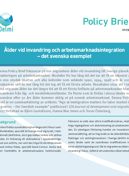With this overview, Delmi wants to help provide a clearer picture of what we know about the foreign - born's integration in the labor market and the possible reasons behind the group's relatively weaker position. The research overview presents a series of analysis and evaluations of the most important policy measures that have been implemented to improve the integration of immigrants in the labor market over the past 16 years. What measures have been most effective and what can be done better?
The study examines five factors that can contribute with explanations. By looking at the reason for immigration, the immigrants human capital, social networks and examining the existing thresholds to the labor market and the discrimination this group has been subjected to when applying for work, the study comes closer to the answer.
Some overall conclusions and recommendations
- Knowledge of the Swedish language is of great importance, partly to get a job and a higher salary, partly in the process of being fairly validated of ones knowledge.
- A number of efforts to bridge the thresholds for immigrants have been successful, including more intensive employment services, supplementary training for people with foreign degrees, financial support for starting a business and comprehensive anti-discrimination legislation.
- There have been shortcomings in Swedish for immigrants (sfi) where teaching has not been adapted sufficiently to the participants' level of education, private establishment consults (etableringslotsar) did not work as intended and subsidized employment had mixed results.
About the author of the report
The Research Overview, Integration Policy and the Labor Market (2015: 3), is written by Patrick Joyce, fil. lic. in economics with experience as an expert and investigator of e.g. labor market and integration issues at the Government Offices and the Riksdag.
Picture by sol from Unsplash.



